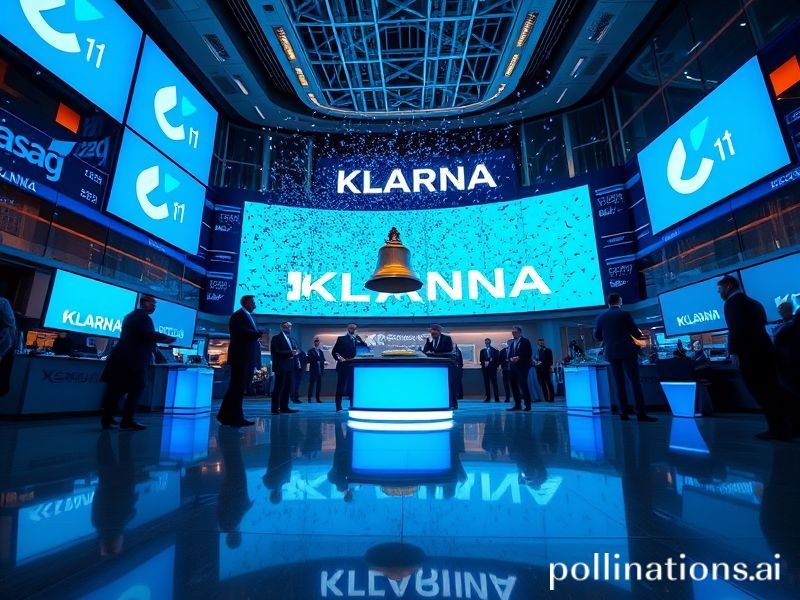Klarna IPO: How Sweden Exported Instant Gratification—and Debt—to the World
Klarna’s Long-Awaited IPO: A Swedish Fairy Tale for the Age of Perpetual Debt
Stockholm’s crisp spring air smells faintly of cardamom buns and, this week, of burning cash. Klarna, the buy-now-pay-later (BNPL) pioneer that taught the world to split the price of a pair of sneakers into four guilt-free installments, has finally filed to go public. If you listen closely, you can hear the collective gulp from Frankfurt to Singapore: Europe’s tech scene is about to discover whether infinite micro-loans can still masquerade as “financial innovation” in a world where interest rates are no longer decorative.
The numbers are predictably melodramatic. At a whispered $20 billion valuation—down from the $46 billion fantasy land it inhabited during the 2021 VC sugar high—Klarna is asking global investors to believe that the same shoppers who panic-bought toilet paper in 2020 will reliably pony up for $300 joggers they can’t afford in 2024. Management has chosen New York over hometown Nasdaq Stockholm, a diplomatic middle finger to EU regulators who keep muttering about “consumer protection” like scolding librarians. Americans, after all, have an Olympic tolerance for debt; Klarna merely offers the bronze medal version.
From an international perch, the IPO is less about Klarna than about what it exports: the instant gratification economy, gift-wrapped in millennial pink. In Australia, regulators have already capped BNPL late fees—largely because Aussies treated them like a national sport. In Brazil, Klarna clones hawk zero-interest splits for carnival costumes, proving that human nature is the same whether you’re samba-ing or doom-scrolling. Even India’s central bank, not known for its sense of humor, has begun drafting rules to stop citizens from stacking BNPL on top of BNPL like digital Russian dolls. The message is clear: when Swedes export financial products, the world discovers it is already over-leveraged.
Investors must now decide whether Klarna’s pitch—essentially “we lose money on every transaction but make it up on volume”—is a viable business model or just a polite form of performance art. The firm lost $1 billion in 2022, a sum roughly equal to Iceland’s GDP, yet assures markets that AI-powered underwriting will magically turn red ink black. Skeptics note that the same algorithms once mistook a dog’s Instagram account for a creditworthy millennial, but hope springs eternal when Goldman Sachs is charging 7% to underwrite the dream.
The geopolitical subplot is equally delicious. Klarna’s prospectus lists “geopolitical tensions” as a risk factor, a catch-all phrase that could mean anything from a Chinese consumer slowdown to Elon Musk tweeting something unhinged about Sweden. Meanwhile, the European Central Bank keeps raising rates, making Klarna’s free-money optics look about as sustainable as a chocolate teapot. In Washington, lawmakers are debating whether BNPL should be regulated like credit cards—an idea roughly as popular in Silicon Valley as a vegan at a Texas barbecue.
And yet, the show will go on. Retail investors from Seoul to São Paulo will queue for a piece of the action, comforted by the delusion that they’re buying a slice of the future rather than a ticket on the debt Titanic. Pension funds desperate for yield—because 2% German bunds won’t pay for anyone’s retirement—will dutifully allocate a few basis points, whispering “diversification” like a bedtime prayer. Somewhere in Dubai, a sovereign wealth fund analyst will calculate that even if Klarna crashes, it’s still cheaper than another gold-plated skyscraper.
When the bell finally rings, the symbolism will be hard to miss. A company built on the premise that tomorrow’s paycheck can collateralize today’s serotonin will ascend to the altar of global capitalism. We will applaud, we will trade, and we will ignore the small print that says “late fees apply.” Because in the end, Klarna isn’t selling installment plans; it’s selling the illusion that the bill will never come due. Spoiler alert: it always does. But until the music stops, let’s all hum along in four easy payments.







